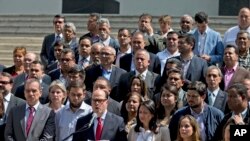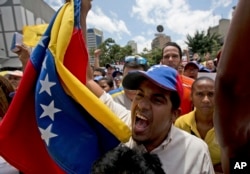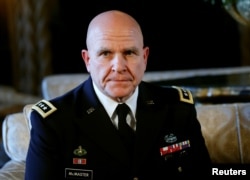Venezuela's opposition is pushing other Latin American countries to pressure President Nicolas Maduro's government into implementing a “democratic agenda,” opposition leader Julio Borges said on Thursday.
Borges, the president of Venezuela's opposition-led National Assembly, traveled to Lima to meet with Peruvian legislators and President Pedro Pablo Kuczynski, who has been one of the most vocal critics of Maduro among Latin American heads of state.
He said the humanitarian crisis and strong protests against Maduro's socialist government had crossed Venezuela's borders due to a wave of refugees across the region.
“The request I'm bringing to the Peruvian congress and president is that they help us, together with other presidents who we've spoken with, to create a large group of presidents who are friends and proponents of democracy in Venezuela,” Borges told Reuters.
Five weeks of protests
Venezuela has suffered through more than five weeks of violent anti-government protests that have left at least 39 dead. The opposition has decried Maduro as an autocrat who has wrecked the OPEC nation's economy, and demanded elections to resolve the political crisis.
Peru recalled its ambassador to Caracas in late March.
Borges said the aim of the strategy of street protests and calls for international pressure was to “break the conscience of the armed forces and the political groups” that still support Maduro, and to avoid more deaths.
“It's important — fundamental — that we get several governments in the region to unite in the short term to make sure in Venezuela there exists nothing other than a popular and democratic agenda,” Borges said upon exiting an interview with local radio station RPP.
He declined to specify which other countries he had visited or planned to visit, but had told RPP that he would seek support from Colombia, Argentina, Ecuador and Brazil. Socialist Venezuela has lost many regional allies as several Latin American countries have moved to the right in recent years.
“There's a new map in Latin America that I'm sure will strongly support this democratic agenda for Venezuela,” Borges said.
Borges meets with McMaster
Last week, Borges met with U.S. President Donald Trump's national security advisor H.R. McMaster, where they agreed on the need to bring Venezuela's crisis to a quick and peaceful conclusion.
The meeting came after Maduro announced the creation of a new popular assembly, which foes decried as a power grab aimed at sidelining the National Assembly.







